Geb 3213 chapter 8 - Study guides, Class notes & Summaries
Looking for the best study guides, study notes and summaries about Geb 3213 chapter 8? On this page you'll find 37 study documents about Geb 3213 chapter 8.
Page 3 out of 37 results
Sort by
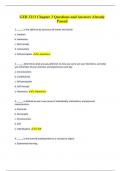
-
GEB 3213 Chapter 3 Questions and Answers Already Passed
- Exam (elaborations) • 11 pages • 2023
-
Available in package deal
-
- $9.49
- + learn more
GEB 3213 Chapter 3 Questions and Answers Already Passed 1. _____ is the ability to be conscious of events and stimuli. a. Intuition b. Awareness c. Self-concept d. Interactivity e. Self-perception b. Awareness 2. _____ determines what you pay attention to, how you carry out your intentions, and what you remember of your activities and experiences each day. a. Consciousness b. Conditioning c. Self-perception d. Self-concept e. Awareness e. Awareness 3. _____ is defined as one...
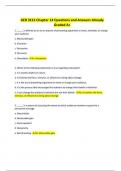
-
GEB 3213 Chapter 10 Questions and Answers Already Graded A+
- Exam (elaborations) • 16 pages • 2023
-
Available in package deal
-
- $9.49
- + learn more
GEB 3213 Chapter 14 Questions and Answers Already Graded A+ 1. _____ is defined as an act or process of presenting arguments to move, motivate, or change your audience. a. Measurable gain b. Elocution c. Persuasion d. Discourse e. Stimulation c. Persuasion 2. Which of the following statements is true regarding motivation? a. It is mostly implicit in nature. b. It involves the force, stimulus, or influence to bring about change. c. It is the act of presenting arguments to move or cha...
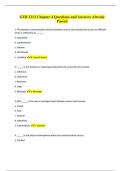
-
GEB 3213 Chapter 4 Questions and Answers Already Passed
- Exam (elaborations) • 8 pages • 2023
-
Available in package deal
-
- $9.49
- + learn more
GEB 3213 Chapter 4 Questions and Answers Already Passed 1. The dynamic communication process between source and receiver that occurs at different times is referred to as _____. a. sequential b. asynchronous c. random d. distributed e. stratified b. asynchronous 2. _____ is the stimulus or meaning produced by the source for the receiver. a. Inference b. Deduction c. Response d. Logic e. Message e. Message 3. A(n) _____ is the way a message travels between source and receiver....
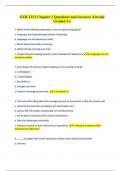
-
GEB 3213 Chapter 2 Questions and Answers Already Graded A
- Exam (elaborations) • 13 pages • 2023
-
Available in package deal
-
- $9.49
- + learn more
GEB 3213 Chapter 2 Questions and Answers Already Graded A+ 1. Which of the following statements is not true about language(s)? a. Languages are living exchange systems of meaning. b. Languages are not bound by context. c. Words themselves hold no meaning. d. Words change meaning over time. e. People interpret language based on their framework of experience. b. Languages are not bound by context. 2. According to the famous linguist Hayakawa, the meaning of words: a. is ontological. b...
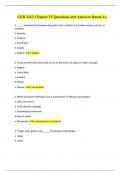
-
GEB 3213 Chapter 15 Questions and Answers Rated A+
- Exam (elaborations) • 12 pages • 2023
-
Available in package deal
-
- $9.49
- + learn more
GEB 3213 Chapter 15 Questions and Answers Rated A+ 1. _____ are phrases that express the goals, aims or nature of a product, service, person, or company. a. Proverbs b. Snippets c. Sound bites d. Quotes e. Slogans e. Slogans 2. These are brief statements that zero in on the point of a larger or longer message. a. Slogans b. Sound bites c. Proverbs d. Idioms e. Phrases b. Sound bites 3. Which among the following is not a characteristic of effective sound bites? a. Clear and ...
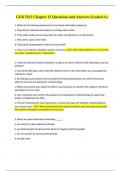
-
GEB 3213 Chapter 13 Questions and Answers Graded A+
- Exam (elaborations) • 14 pages • 2023
-
Available in package deal
-
- $9.49
- + learn more
GEB 3213 Chapter 13 Questions and Answers Graded A+ 1. Which of the following statements is true about informative speeches? a. They seek to motivate the audience to change their minds. b. They notify audiences on issues that are under consideration in a referendum. c. They aim to start a new habit. d. They aspire to get people to take on a new belief. e. They try to influence people to adopt a new idea. b. They notify audiences on issues that are under consideration in a referendum. ...
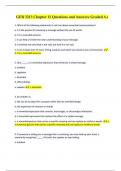
-
GEB 3213 Chapter 11 Questions and Answers Graded A+
- Exam (elaborations) • 14 pages • 2023
-
Available in package deal
-
- $9.49
- + learn more
GEB 3213 Chapter 11 Questions and Answers Graded A+ 1. Which of the following statements is not true about nonverbal communication? a. It is the process of conveying a message without the use of words. b. It is a reversible process. c. It can help or hinder the clear understanding of your message. d. It involves not only what is not said, but how it is not said. e. It can include tone of voice, timing, posture, and where you stand as you communicate. b. It is a reversible process. 2....
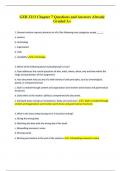
-
GEB 3213 Chapter 7 Questions and Answers Already Graded A+
- Exam (elaborations) • 13 pages • 2023
-
Available in package deal
-
- $9.49
- + learn more
GEB 3213 Chapter 7 Questions and Answers Already Graded A+ 1. General revision requires attention to all of the following main categories except _____. a. content b. technology c. organization d. style e. readability b. technology 2. Which of the following about evaluating style is true? a. Style addresses the central questions of who, what, where, when, why and how within the range and parameters of the assignment. b. Your document may use any of a wide variety of style principles,...
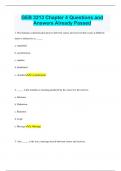
-
GEB 3213 Chapter 4 Questions and Answers Already Passed
- Exam (elaborations) • 13 pages • 2023
-
Available in package deal
-
- $9.99
- + learn more
GEB 3213 Chapter 4 Questions and Answers Already Passed 1. The dynamic communication process between source and receiver that occurs at different times is referred to as _____. a. sequential b. asynchronous c. random d. distributed e. stratified b. asynchronous 2. _____ is the stimulus or meaning produced by the source for the receiver. a. Inference b. Deduction c. Response d. Logic e. Message e. Message 3. A(n) _____ is the way a message travels between source and receiver. a. trans...
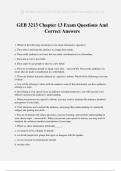
-
GEB 3213 Chapter 13 Exam Questions And Correct Answers
- Exam (elaborations) • 12 pages • 2024
-
- $10.49
- + learn more
GEB 3213 Chapter 13 Exam Questions And Correct Answers 1. Which of the following statements is true about informative speeches? a. They seek to motivate the audience to change their minds. b. They notify audiences on issues that are under consideration in a referendum. c. They aim to start a new habit. d. They aspire to get people to take on a new belief. e. They try to influence people to adopt a new idea. - answerb. They notify audiences on issues that are under consideration in a refe...

How did he do that? By selling his study resources on Stuvia. Try it yourself! Discover all about earning on Stuvia


